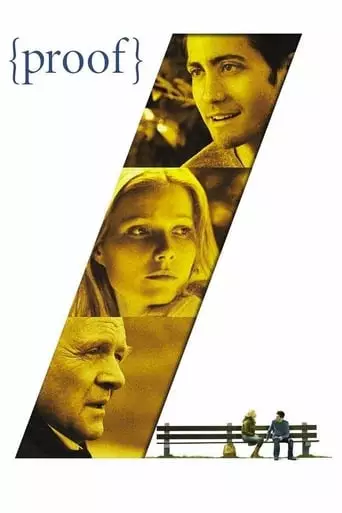
Proof (2005) Watch Online Free
Catherine is a woman in her late twenties who is strongly devoted to her father, Robert, a brilliant and well-known mathematician whose grip on reality is beginning to slip away. As Robert descends into madness, Catherine begins to wonder if she may have inherited her father’s mental illness along with his mathematical genius.
Proof (2005), directed by John Madden, is a poignant drama that delves into themes of genius, mental illness, and the quest for validation. Adapted from David Auburn’s Pulitzer Prize-winning play, the film centers on Catherine Llewellyn (Gwyneth Paltrow), the daughter of a brilliant but mentally unstable mathematician, Robert Llewellyn (Anthony Hopkins).
Plot Overview
The narrative unfolds in Chicago, where Catherine has spent years caring for her father, who succumbed to mental illness. Following his death, Catherine grapples with her own mental health and the legacy of her father’s genius. Hal (Jake Gyllenhaal), a former student of Robert’s, discovers a groundbreaking mathematical proof among Robert’s notebooks. He believes it to be Robert’s work, but Catherine claims authorship, leading to a conflict that challenges their perceptions of truth and identity.
Character Dynamics
Catherine’s relationship with her sister, Claire (Hope Davis), adds another layer of complexity. Claire’s pragmatic approach to life contrasts with Catherine’s emotional and intellectual struggles, highlighting themes of familial duty and differing coping mechanisms. The film intricately portrays Catherine’s internal conflict between honoring her father’s legacy and asserting her own identity.
Mathematical Themes
While Proof is not a mathematics-centric film, it effectively uses mathematical concepts as metaphors for the characters’ lives. The proof itself symbolizes the search for truth and the desire for recognition. The film subtly explores the nature of genius and the fine line between brilliance and madness.
Genius and Madness
Proof explores the delicate balance between genius and mental illness. Robert’s brilliance is overshadowed by his mental instability, and Catherine fears inheriting his condition. The film examines how exceptional talent can be both a gift and a curse, affecting personal relationships and self-perception.
Identity and Validation
The quest for personal identity and the need for validation are central themes. Catherine’s struggle to prove her authorship of the proof reflects her desire to be recognized for her own intellect, separate from her father’s shadow. The film delves into the human need for acknowledgment and the lengths one might go to achieve it.
Family Dynamics
The complex relationships between Catherine, her father, and her sister are at the heart of the narrative. The film portrays the burdens of caregiving, sibling rivalry, and the differing ways family members cope with loss and legacy. These dynamics highlight the challenges of familial love and support.
Trust and Doubt
Trust and doubt permeate the storyline, particularly concerning the authenticity of the mathematical proof. The characters’ skepticism towards each other’s claims reflects broader themes of trust in relationships and self-doubt. The film prompts viewers to question the nature of truth and the reliability of personal perceptions.
Upon its release, Proof received generally positive reviews from critics. Roger Ebert praised the film, stating, John Madden’s ‘Proof’ is an extraordinary thriller about matters of scholarship and the heart, about the true authorship of a mathematical proof and the passions that coil around it.
The film’s exploration of complex emotional and intellectual themes resonated with audiences and critics alike. It was noted for its strong performances, particularly by Gwyneth Paltrow and Anthony Hopkins, and its sensitive handling of mental health issues. The film holds a 62% rating on Rotten Tomatoes, indicating generally positive reviews.
After viewing Proof, audiences are likely to experience a range of emotions:
In summary, Proof is a thought-provoking film that masterfully blends intellectual pursuit with deep emotional storytelling, leaving a lasting impression on its audience.
